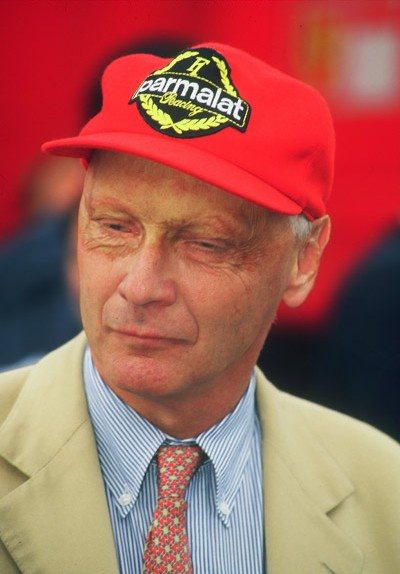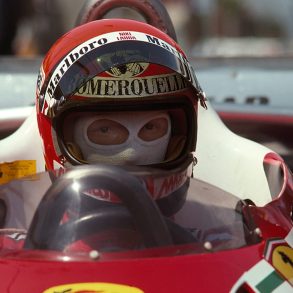I was moonlighting for Flight Safety International as a Flight Instructor in the DA-20 Falcon Jet in the early 1980s. One day the Chief Instructor (who knew I was into racing) asked if I had ever heard of a famous racing driver named “Liddy,” or “Ludy,” or “Laddy,” or something like that. I asked, “Could it be Lauda?” “Yea, that’s it,” he replied. “Well this guy’s coming in next week to get his type rating – don’t suppose you’d like to take him?” I wasn’t scheduled to work that week but this was too good to pass up.

During the first briefing the instructor determines how prepared and motivated the student is. Ground school knowledge and familiarity with the aircraft systems, or the lack of same, are readily apparent. The first simulator session is where the student’s flying abilities and learning patterns are observed. This is where you realize what type of student you have and how much work you will need to do to get him up to speed.
Within 5 minutes of talking it was apparent that Niki had not only done his homework for that day, he had completed his reading for the entire course. He was asking questions that normally only qualified Falcon pilots would ask. Total preparation was something foreign to me. I realized he did not just want to learn to fly this aircraft, it was almost an obsession with him. He was going to do it to the best of his ability – perfection was the goal. Now, what to do? We had two hours every day to pass the time away. Discussion of the day’s lesson only took about an hour. So, we made a deal. We would talk racing for an hour then I would put on the instructor’s hat and we’d talk about flying. To this Niki quickly agreed…
I would bring my copies of Autocourse and period magazines. He would tell me about this race and that race with a clarity of memory that was absolutely incredible. “That’s where that @^*%^$% Regazzoni punted me in the arse. Two laps later the wishbone broke.” “I passed Piquet just here on the next lap.” “Here they gave Rega the newer engine, but I beat him anyway.” “That car was sh%t!” Factual always. Even when looking at the report of his accident, of which he remembered nothing after the corner before the impact, he was unmoved. The only emotion I saw was a light in his eyes that would sparkle whenever we talked of his racing career. Even though he was retired at this point, and on his way to create Lauda Air, the passion was still very evident. He was also willing to listen to my questions regarding my racing (a D-Production Triumph GT-6) and never looked down on racing at that level. It brought out memories of his first saloon racing (a Mini) under an assumed name, as his parents definitely disapproved of such activity.
As to the flying part? To this day I have not seen such hand-to-eye coordination. This plus the fact that he was as prepared as he could be for each lesson and the asked most intelligent questions about what he could expect to see, hear, and feel, made teaching him a breeze. Normally a student will try a maneuver a couple of times before being comfortable and reasonably competent. Not Niki. Most maneuvers he would do once with no introduction, correct himself, and do the maneuver again, usually in a completely competent manner. I would ask if he was satisfied and he would nod. On to the next maneuver! However, this attitude towards perfection did lead to a spot of discord. The support co-pilot we had arranged was a young lady who was building flight time. She was licensed to fly the Falcon and a reasonably competent pilot. However, this was not good enough, and Niki does not suffer fools or incompetents at all. After a few mistakes made by the young lady (who was quite easy on the eyes) Niki looked at me and said, “Get rid of her!” No second chance, no apology, no remorse. “Sorry, darlin’.”
For the rest of the time I was his co-pilot, operating the simulator and supporting him. It actually made matters easier and I had to stay on my toes to keep ahead of him. The only time he needed what I would call normal instruction was in performing a very complicated, heavy weight single-engine maneuver with minimum instrumentation. His first attempt, while adequate, needed some additional instruction. We talked about it for a moment and he said, “You do it.” I did the maneuver (fairly well to my relief) while he watched. After it was complete he just looked straight ahead for several seconds then nodded to himself. His turn, and it was as close to perfect as could be. I was fortunate to see the “computer” in action. It was as if he had run through it in his head, sorted out the faulty code, and re-programmed himself.
While this ability made it easy to teach him there was a downside. He was ready to take his final check ride (at another facility) a day early. That deprived me of one last day with him, as our briefing sessions had evolved into talking of racing exclusively. He left as soon as he was ready.
That was not the last time I saw him. Later, I was at the ill-fated Las Vegas Grand Prix, where I got his attention. He called me over and took me into the pits. I also got to spend a few moments with Ron Dennis in the McLaren motor home. The following year a lady friend and I spent the Montreal and Detroit races in the McLaren pits. In all three instances we did not have the appropriate credentials. In two cases we were stopped and he just said, “They are with me.” Nuff said! In Montreal the gate guards were so preoccupied with getting his autograph we just walked through.
I have been asked what type of person he is. Everyone accepts he is technically brilliant and a masterful driver. However, there have been stories circulated about how rude or arrogant he can be. I never saw anything like that. While that may merely mean I did not see it, I would surmise this reputation comes from Niki’s inability to accept less than total performance. If you are not doing your best then I believe he has little respect for you. And that often can be mistaken for rudeness or arrogance. He expects nothing less of himself. I felt almost honored to have the opportunity of teaching him and, in turn, I learned about not accepting less than the best you can do.
One of the greatest compliments I have ever received was when he thanked me for doing a good job. High praise indeed!










